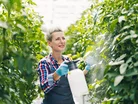Top 10 sustainable food manufacturers

Following the COVID-19 pandemic and the ensuing supply chain chaos, consumers want to know more about where their food comes from.
As the reality of the climate crisis sets in, consumers also want to know what environmental impact is caused by the products they buy.
Here are our Top 10 sustainable food manufacturers who are working from farm to factory to Aisle Seven of your local supermarket, to ensure tonight’s dinner does not cost the earth.
10. Cauldron
Headquartered in Bristol, UK
Founded in 1981
Known for its tofu, falafel and vegetarian sausages, Cauldron plans to be Net Positive by 2030. In the meantime, the company is investing in offsetting initiatives in the UK, Brazil, Nicaragua and Nigeria.
“We have transferred to 100% renewable electricity in all our factory sites and currently 97% of all packaging is recyclable,” said a Cauldron representative.
9. Venchi
Headquartered in Castelletto Stura, Italy
Founded in 1878
In a recent interview with Manufacturing Digital, Venchi's Marketing Director, Cècile Osti, discussed how the luxury chocolate brand was moving in a sustainable direction.
“Venchi’s investments, dedicated to reducing its environmental impact, have grown steadily over the years, focusing on the continuous improvement of production processes and careful selection of materials and suppliers,” she said.
8. Dr Schär
Headquartered in Burgstall, Italy
Founded in 1981
Sustainable and certified products play a huge role in Dr Schär’s food manufacturing.
“Since 2016, we only use certified palm oil and offer a variety of palm oil free solutions, such as blends of other vegetable oils. In addition, we contribute to making cocoa farming more sustainable and improving working conditions in the industry,” said a representative.
7. Riverside Natural Foods
Headquartered in North York, Canada
Founded in 2013
As a certified B Corp, Riverside Natural Foods is a trusted sustainable food manufacturer. Producer of MadeGood’s popular granola and cookies, the company believes the food chain needs a complete business transformation if society is to flourish in the 21st Century. The company is dedicated to reducing its Scope 1, 2 and 3 emissions and reuses, recycles or composts 90% of its waste.
6. Alpro
Headquartered in Gent, Oost-Vlaanderen
Founded in 1980
Sue Garfitt, General Manager at Alpro, knows that modern-day diets are no longer sustainable for the planet
“We have to change the way we look at food production and consumption'', explains Garfitt. ''Our brand has a mission to promote more flexitarian diets. We want to keep bringing more choice and that's why innovation lies at the heart of what we do at Alpro.''
5. Cargill
Headquartered in Wayzata, Minnesota, USA
Founded in 1865
Food manufacturers are aware of consumer trends, such as the rising number of vegans and flexitarians avoiding meat due to the environmental impact of farming.
“Caring about the sustainability of the planet is not only the right thing to do for people and the environment, it is also good for business,” said David MacLennan, Cargill’s Chairman and CEO.
4. innocent Drinks
Headquartered in London, UK
Founded in 1998
innocent’s new US$250mn carbon-neutral factory was built with sustainable manufacturing in mind. Powered by solar panels and wind turbines, ‘the blender’ facility in The Netherlands, claims to be ‘the earth’s most sustainable healthy drinks factory’ which will produce up to 300mn litres each year.
innocent’s new US$250mn carbon-neutral factory was built with sustainable manufacturing in mind. Powered by solar panels and wind turbines, ‘the blender’ facility in The Netherlands, claims to be ‘the earth’s most sustainable healthy drinks factory’ which will produce up to 300mn litres each year.
3. Nestlé
Headquartered in Vevey, Switzerland
Founded in 1866
Nestlé has come a long way from the baby milk formula scandal and is truly pushing for ‘Good Food, Good Life’ for all - from the factory floor to shop shelves.
“Our organic growth was strong, with broad-based market share gains, following disciplined execution, rapid innovation and increased digitalization,” said Mark Schneider, Nestlé CEO, of Nestlé’s performance in 2021.
2. Danone
Headquartered in Paris, France
Founded in 1919
More than 50% of Danone’s global sales are covered by B Corp certification, showing that the company has made significant progress to reach the highest social and environmental criteria.
In the Nutricia Cuijk facility, specialised manufacturing processes are applied to enable Danone to produce foods for special medical purposes
“The Nutricia Cuijk facility is a significant investment towards achieving our One Planet. One Health vision. We will be producing food for vulnerable babies; and we’re also doing everything we can to preserve a healthy and clean environment for future generations," said Véronique Penchienati-Bosetta, Executive Vice President Danone Specialised Nutrition.
1. Unilever
Headquartered in London, UK
Founded in 1872
As one of the biggest food manufacturers in the world, Unilever understands it has a responsibility to influence the global food system in a way that is fair for everyone. The ‘Future Foods’ initiative is designed to help consumers reduce their environmental impact.
Future Foods will see Unilever commit to:
- Halve food waste in direct operations from factory to shelf by 2025
- Continue to lower calories, salt and sugar across all products
- The University Manufacturing Circuit Boards from LeavesSustainability & ESG
- Schneider Electric's Commitment to Sustainable ManufacturingSustainability & ESG
- Lenovo & Saudi Alat Building Green Manufacturing FacilitySustainability & ESG
- Nissan Brings Biodiversity to the Factory through RewildingSustainability & ESG











